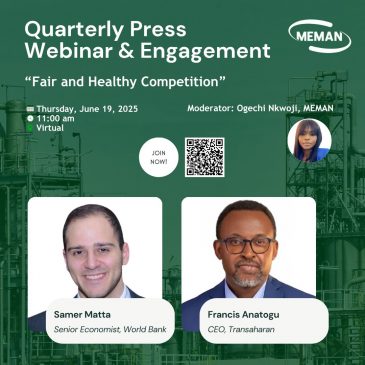Dangote’s Fuel Distribution Plan: MEMAN calls for balanced competition in Downstream Sector
***** Nigerian business environment holding back competition, World Bank laments
By Yunus Yusuf
The Major Energies Marketers Association of Nigeria (MEMAN) has urged for greater transparency regarding Dangote Refinery’s recent announcement to offer free logistics services for petrol and diesel distribution nationwide.
MEMAN’s CEO, Mr Clement Isong, shared this during the association’s quarterly online press webinar on Thursday.
He explained that Dangote Refinery plans to provide free logistics support not only to marketers but also manufacturers, telecom companies, aviation firms, and other bulk users.
The webinar, themed “Fair and Healthy Competition in the Nigerian Market,” gathered media, industry experts, and stakeholders to discuss Nigeria’s evolving energy sector amid growing private investments and infrastructure development.
Welcoming the innovation, Isong stressed the need for detailed information about the refinery’s distribution plan, especially on logistics and pricing.
“We’ve seen reports that Dangote Refinery will start free logistics from August 15. But we need clarity on the operational scope, geographic coverage, and practical details.
“This requires dialogue among Dangote, regulators, stakeholders, and the media,” he said.
He warned against premature conclusions, noting, “Some claims suggest nationwide fuel price standardisation, but we don’t know if that’s true. Clarity is essential before meaningful engagement.”
Isong reaffirmed MEMAN’s commitment to fostering open market competition and praised innovative moves like the introduction of Compressed Natural Gas (CNG) trucks.
He said that many MEMAN members have adopted initiatives such as solar-powered stations and logistics pooling to improve efficiency and cut costs.
He described Dangote Refinery’s plan to deploy 4,000 CNG-powered trucks as “brilliant” but flagged concerns around fairness, competition, and regulatory oversight.
“That’s a huge leap for logistics and environmental sustainability,” Isong said.
“But it also raises worries about potential market dominance and unfair competition among energy marketers.”
He noted that MEMAN members are similarly shifting from diesel to CNG trucks, aligning with the federal government’s policy to reduce fossil fuel dependence and promote cleaner energy.
However, he emphasised the policy is still nascent and infrastructure gaps remain.
“CNG is a government policy in progress. We lack adequate infrastructure, so planning is critical,” he remarked.
Isong highlighted Dangote’s prior experience with CNG trucks in its cement business, where around 2,000 trucks have been converted, giving the company an advantage in fuel logistics transformation.
While welcoming innovation, he insisted on a robust regulatory framework to prevent anti-competitive practices and market capture.
“The Federal Competition and Consumer Protection Commission (FCCPC) and the Nigerian Midstream and Downstream Petroleum Regulatory Authority (NMDPRA) must balance innovation with the risk of dominance,” Isong stated.
“This requires ongoing dialogue with regulators to determine what’s best for the market.”
MEMAN continues to advocate for deregulation, open competition, and private-sector-led innovation.
“We can’t oppose innovations like CNG trucks — innovation is necessary,” he said.
Still, Isong stressed the industry is carefully evaluating Dangote’s initiative and will engage with relevant parties before taking a definitive stance.
“We’re monitoring the market and need to understand the full impact before making firm statements,” he explained.
He underscored the importance of dialogue to align innovation with national interest and consumer welfare.
“It would be irresponsible to rush conclusions. We must consider what’s best for Nigeria and its citizens,” Isong added.
Isong acknowledged risks in a deregulated market, including potential monopolies, but highlighted the benefits of competition for efficiency and sustainability.
“Free market competition drives innovation but carries risks of market capture.
“That’s why regulators and the press play a critical role in safeguarding consumer interests,” he said.
He emphasised, is a fundamental development issue and must be priced and distributed to support growth without overburdening the public.
“If energy prices are too high, ordinary Nigerians suffer and national development slows. This conversation on pricing, distribution, and logistics must continue,” he concluded.
On logistics collaboration, Isong noted the industry’s history of pooling resources to reduce costs.
“Many MEMAN members buy from Dangote and collaborate on logistics to optimize expenses. Globally, the oil sector pools assets from rigs to transport,” he said.
“Competition happens mostly at the retail level, but cooperation along the supply chain ensures affordability and efficiency.”
As Nigeria advances its energy transition, Dangote’s introduction of 4,000 CNG trucks marks a pivotal moment.
How this initiative is regulated, scaled, and integrated into the national framework will determine its benefits or risks to Nigeria’s downstream sector balance.
Earlier, Dangote Industries announced that from August 15, 2025, its refinery would begin nationwide petrol and diesel distribution supported by 4,000 new CNG-powered tankers, revealed Mr Abiodun Alade, Dangote’s Internal Communications Specialist.
MEMAN affirmed it is closely monitoring the market and will engage constructively once it fully understands Dangote’s operational framework and policy implications.
Also the World Bank Group has lamented that businesses and investors perceive the policy environment in Nigeria to be holding back competition.
Senior Economist, World Bank Group, Samer Matta in his presentation titled “Catalysing Competition in Nigeria” said monopolies and market concentration remain pervasive in key Nigerian sectors.
On the existence of clear rules for stable, market-based competition table for 2024 which has 0 as lowest and 20 as highest, Nigeria ranked lowest, trailing behind others countries which included; Egypt, Ghana, Indonesia,India and South Africa.
Specifically, he said government protection does not promote refining efficiency nor does it deliver benefits to consumers.
According to him, refineries should be exposed to vigorous competition, warning that allowing only refineries to import products would eliminate competition from imports.
“The policy of allowing domestic refineries to supply the domestic market first and allowing imports only when there is a shortfall also goes against competition policy as contained in section 317 (9) in the PIA is misguided,’’.




